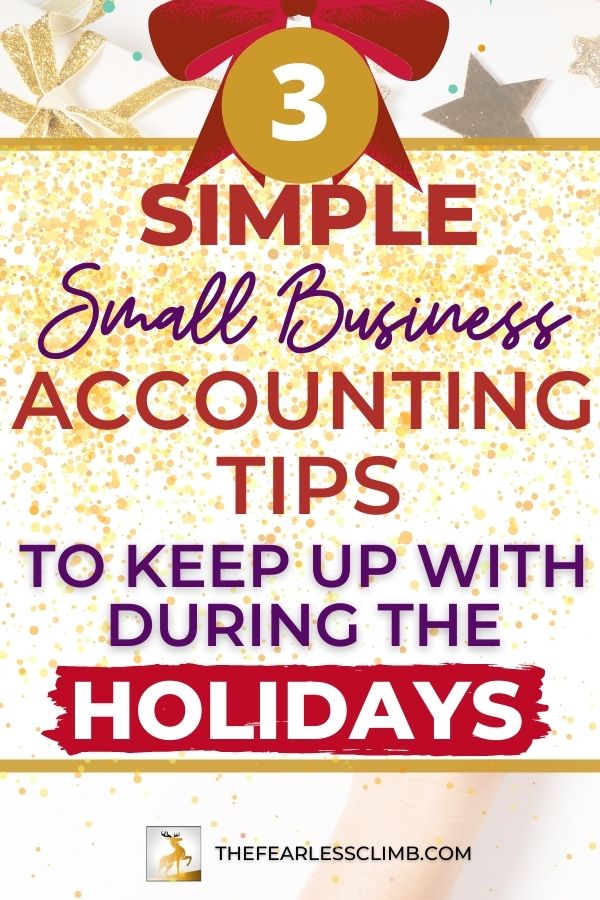3 Simple Small Business Accounting Tips to Keep Up with During the Holiday Season

By: Kathleen Ries-Jubenville | Read time: 4 minutes
The holiday season is a time for family and food, gifts and traditions, but it is also a time to prepare for the income tax reporting season that sneaks down the chimney just after Santa leaves. Here are 3 simple business accounting tips to keep up with during the holiday season to make your new year a little bit easier.
1. Identify All "Cross-Over" Financial Transactions
It is common for business owners to use personal money to pay for business expenses, and vice versa. These are "cross-over" transactions and they must all be reflected in your accounting records.
First, review all your personal bank and credit card accounts for the year and identify any payments or charges that were for business expenses.
Then, review all your business bank and credit card accounts for the year and identify any payments or charges that were for personal expenses.
Also, if you accepted business payments through any source that deposited the money to your personal bank account, you must include them in your business income total in your accounting records and tax returns. This often occurs when people pay businesses through Venmo or PayPal or Zelle.
Finally, review the transfers, deposits and withdrawals between your personal and business accounts and confirm they are recorded properly in QuickBooks. They all should be posted in equity-type accounts, never in income or expense accounts.
If you don't know how to enter "cross-over" transactions into your accounting records, just send the information to your bookkeeper and they will take care of it for you.
2. Make End-of-Year Deposits and Pay Your Bills
Most small businesses file their income tax returns on a cash basis. This means you are calculating your income tax liability on income you have actually received and on bills you have actually paid. (As opposed to accrual basis where you would be paying income taxes on invoiced sales, even if you hadn't been paid yet.)
If you are a cash basis business, you need to know about an IRS rule called "Constructive Receipt". This means you must record income when you have control of the money, even if you haven't deposited it yet. So, if you pick up a check from a client or receive it in the mail on December 31st, but don't deposit it in your bank account until January 2nd, the income is still "constructively received" on the 31st and must be counted in that year. In other words, you cannot postpone making the deposit or recording the income to delay paying taxes on it. With that in mind, it is much better for you to deposit the check on the same day you receive it. That way, your bank statement, financial reports, and income tax return all include that money in your total sales for the year.
The good news is you also get the benefit of including any bills you pay by December 31st as expenses to be deducted on your income tax return. So, if you have the cash flow to do it, you may want to pay your bills by the end of the year, even if they are not due until sometime in January.

CLICK HERE TO DOWNLOAD YOUR FREE EBOOK!
3. Organize Your Accounting Records
I often meet with business owners who have boxes of receipts and statements laying around their office or piles of paperwork to file all over their desk. I understand we are all busy. However, if there is ever a question about a bill payment or customer deposit, disorganization makes it so difficult to find the answer. And, a tax audit will be a nightmare! The end of the year is a good time to get organized and create an easy system to stay organized. If you don't have time to do it, can your kids, your niece or nephew, or the neighbor's kids help you with your filing? Here are a few ways to do it: For a very small business, one expanding file folder for each income tax return's documents should be enough. For example, you could have one folder for all your business receipts and statements and one folder for your personal tax documents. For a larger business, create one file folder for each letter of the alphabet and one for the vendors you pay regularly, For example, create a separate folder for your office lease bills and your telephone bills, but just use the "S" folder for all the one-time bills you received from vendors whose names start with the letter "S". The best procedure is to create all the filing folders at the beginning of the year, so you can just stuff the paid bills, receipts, and statements in quickly all year long and you never end up with a huge pile of papers to file on your desk.
PS: This is also a good time to scan all your income tax documents so you can quickly upload them to your income tax preparer's secure online portal.
If you are not sure how to put together a low-cost, high-quality bookkeeping and accounting team, click here and download the free eBook called, "The Small Business Accounting Team: A Business Owner's Guide to Delegation and Peace of Mind"!
The Fearless Climbers
Business Newsletter
Sign up for weekly mindset, marketing & sales tips for entrepreners!
Subscribe now to get your first edition today!
You can unsubscribe any time and we will never sell your information.



